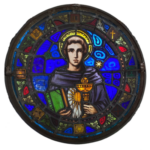THE SACRAMENT OF THE EUCHARIST
All children baptized in the Catholic Church who have reached the age of seven years and are in second grade or higher are eligible to receive the Sacrament of the Eucharist, also known as First Holy Communion. Our sacramental preparation team guides parents and children to help them grow in God’s Love as they journey towards the Lord’s Table. Children prepare for the Sacrament of Penance in the first half of the school year and prepare for their First Holy Communion in the second half of the school year. Each child must also be enrolled in a religious education class. Parents who feel their child is ready for this sacrament should attend a Parent Sacramental Registration meeting. For more information about sacramental preparation or if your child is not baptized in a Catholic Church, please contact the Parish Office via email ([email protected]), or phone (757) 569-9600.
More on the Sacrament of the Eucharist
The Lord Jesus, on the night before he suffered on the cross, shared one last meal with his disciples. During this meal our Savior instituted the sacrament of his Body and Blood. He did this in order to perpetuate the sacrifice of the Cross throughout the ages and to entrust to the Church his Spouse a memorial of his death and resurrection. As the Gospel of Matthew tells us:
While they were eating, Jesus took bread, said the blessing, broke it, and giving it to his disciples said, “Take and eat; this is my body.” Then he took a cup, gave thanks, and gave it to them, saying, “Drink from it, all of you, for this is my blood of the covenant, which will be shed on behalf of many for the forgiveness of sins.” (Mt 26:26-28; cf. Mk 14:22-24, Lk 22:17-20, 1 Cor 11:23-25)
Recalling these words of Jesus, the Catholic Church professes that, in the celebration of the Eucharist, bread and wine become the Body and Blood of Jesus Christ through the power of the Holy Spirit and the instrumentality of the priest. Jesus said: “I am the living bread that came down from heaven; whoever eats this bread will live forever; and the bread that I will give is my flesh for the life of the world. . . . For my flesh is true food, and my blood is true drink” (Jn 6:51-55). The whole Christ is truly present, body, blood, soul, and divinity, under the appearances of bread and wine—the glorified Christ who rose from the dead after dying for our sins. This is what the Church means when she speaks of the “Real Presence” of Christ in the Eucharist. This presence of Christ in the Eucharist is called “real” not to exclude other types of his presence as if they could not be understood as real (cf. Catechism, no. 1374). The risen Christ is present to his Church in many ways, but most especially through the sacrament of his Body and Blood.
~ from USCCB
